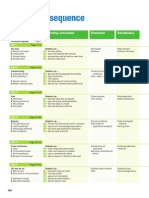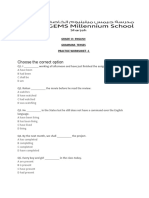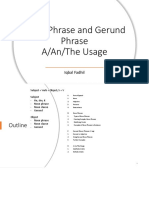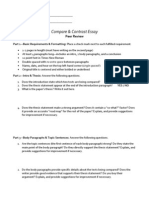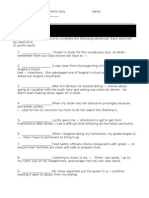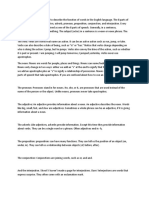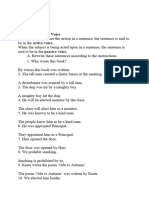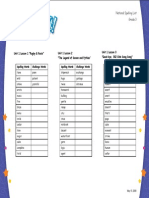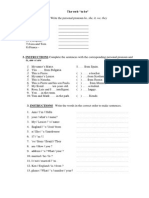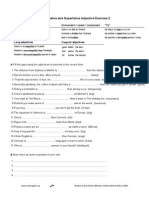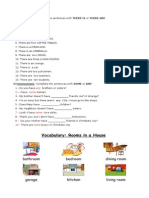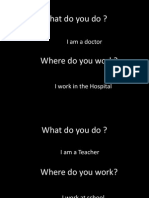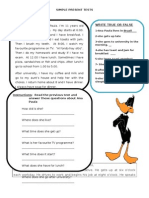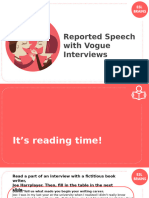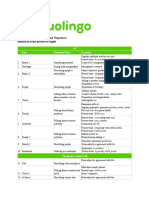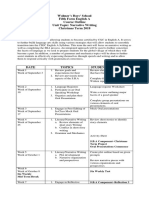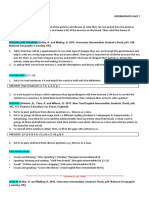0 ratings0% found this document useful (0 votes)
308 viewsParts of Speech
Parts of Speech
Uploaded by
juanteacher2020In English there are eight parts of speech: verb, noun, adverb, adjective, pronoun, article, preposition, and conjunction. A verb tells tense (time: present, past, future), voice (active / passive / imperative) and number (singular / plural) there are also auxiliary or helping verbs.
Copyright:
© All Rights Reserved
Available Formats
Download as PDF, TXT or read online from Scribd
Parts of Speech
Parts of Speech
Uploaded by
juanteacher20200 ratings0% found this document useful (0 votes)
308 views14 pagesIn English there are eight parts of speech: verb, noun, adverb, adjective, pronoun, article, preposition, and conjunction. A verb tells tense (time: present, past, future), voice (active / passive / imperative) and number (singular / plural) there are also auxiliary or helping verbs.
Copyright
© © All Rights Reserved
Available Formats
PDF, TXT or read online from Scribd
Share this document
Did you find this document useful?
Is this content inappropriate?
In English there are eight parts of speech: verb, noun, adverb, adjective, pronoun, article, preposition, and conjunction. A verb tells tense (time: present, past, future), voice (active / passive / imperative) and number (singular / plural) there are also auxiliary or helping verbs.
Copyright:
© All Rights Reserved
Available Formats
Download as PDF, TXT or read online from Scribd
Download as pdf or txt
0 ratings0% found this document useful (0 votes)
308 views14 pagesParts of Speech
Parts of Speech
Uploaded by
juanteacher2020In English there are eight parts of speech: verb, noun, adverb, adjective, pronoun, article, preposition, and conjunction. A verb tells tense (time: present, past, future), voice (active / passive / imperative) and number (singular / plural) there are also auxiliary or helping verbs.
Copyright:
© All Rights Reserved
Available Formats
Download as PDF, TXT or read online from Scribd
Download as pdf or txt
You are on page 1of 14
Table of Contents
Quick and handy grammar review articles 2
Parts of speech and their functions review and analysis chart 4
Exercise 1:
Place the correct word in the blank space and indicate its part of speech. 5
Exercise 2:
Insert a word in the blank, and indicate its part of speech. 6
Exercise 3:
Insert a word in the blank, and indicate its part of speech. 7
Exercise 4:
Identify all the words in the following sentences. 8
Exercise 5:
Identify all the words in the following sentences. 10
Exercise 6:
Identify the adjectives in the sentences. 12
Exercise 7:
Identify the nouns in the sentences. 12
Exercise 8:
Identify the verbs in the sentences. 13
Exercise 9:
Identify the adverbs in the sentences. 13
Answer Key 14
Copyright 2011, Red River Press Inc. For use by members of ESL-library.com in accordance with membership terms. 1
Parts of Speech!
Grammar Practice Worksheets
Quick and Handy Grammar Review Articles:
The basic form in English is the word. It is very important to find out as much as you can about the word when you learn
a new one. One important fact is the words part of speech. From the part of speech, you will find out how the word
functions or works. In English there are eight parts of speech: verb, noun, adverb, adjective, pronoun, article, preposition,
and conjunction.
Verb:
A verb provides a great deal of information. It tells tense (time: present, past, future; tense: simple, progressive, perfect,
perfect progressive), voice (active/passive/imperative) and number (singular/plural). . There are also auxiliary or helping
verbs.
1. Action I ate delicious tacos in a Mexican restaurant.
The thief ran away from the security guard.
2. State of being Dr. Jackson is a general practitioner.
Ms. Rodriguez was the best teacher in my middle school.
3. Passive voice Dr. Martin Luther King was murdered in Memphis, Tennessee in 1968.
Jay-Z was born in Brooklyn in 1969.
4. Imperative Don't hang up! Stay on the phone. Listen to me.
5. Auxiliary Vidhi's boyfriend is baking a cake for her birthday party.
Noun:
A noun is a person, place, or thing. It is also a concept, a mood, or an attitude.
Function: A noun is a subject or an object. As the subject, it usually goes near the beginning of the sentence, just before
the verb. As the object, it comes after a verb or a preposition. The noun may be compound (police officer), common
(rice), collective (the team), or proper (Eliza).
1. Paolo is from Buenos Aires, Argentina.
2. Wine is more expensive than beer.
3. The navy lost the important battle.
4. Jealousy is not a sign of love.
5. My sister is a fantastic cook.
6. The workbook is on the table.
Adverb:
An adverb usually goes right after the verb. Many adverbs end in ly.
Function: An adverb modifies a verb. It may also modify another adverb or an adjective. Adverbs usually answer
questions: 1) Time (when?) 2) Manner (how?) 3) Place (where?) 4-5) Degree (how much?) 6) Frequency (how often?).
Note, yesterday, today, tomorrow, and now are adverbs. So are here and there. There are also adverbs of frequency (al-
ways, usually, often, sometimes, occasionally, rarely, seldom, never).
1. Time 1.a. Kerry left immediately after the speech.
1.b. Nancys sister is living in Philadelphia now.
2. Place 2.a. My aunt lives here in this beautiful house.
2.b. Michael is there in the black sports car.
3. Manner 3.a. Maria dances well.
3.b. The romantic singer whispers softly.
4. Frequency 4.a. Jonathan sometimes calls his ex-girlfriend at four o'clock in the morning.
4.b Hanna always eats popcorn at the movies.
5. Describing an adjective 5.a. Harry has very big feet.
5.b. Amy is incredibly lucky.
6. Describing an adverb 6.a. Mariza speaks very fast when she is angry.
6.b Nestor walked extremely slowly out of the class.
Copyright 2011, Red River Press Inc. For use by members of ESL-library.com in accordance with membership terms. 2
Parts of Speech!
Review - Grammar Practice Worksheets
Adjective:
Adjectives are colorful words that we use to tell about a person, place, thing, or experience. When you use clear adjec-
tives, people can get a picture of the noun you are describing.
Function: An adjective describes a noun or a pronoun and is usually placed right before the noun. It may go after a be
verb. Possessives that go before a noun are adjectives. Numbers are adjectives.
1. The long movie was interesting.
2. Kristine has brown hair.
3. The Mexican quartet played excellent music.
4. The hungry soldier ate four slices of pizza.
5. The old sailor told a crazy story about gigantic whales.
6. His dog is brown and white.
Pronoun:
A pronoun stands for a noun. It may refer to a noun previously mentioned. For example: Johann gave the novel to his
mother may be said: He gave it to her. The antecedent of He is Johann. The antecedent of it is the novel. And the ante-
cedent of her is his mother.
Function: A pronoun may be a subject, an object, a possessive, or a relative pronoun.
Subject 1.a. He is a butcher.
1.b. They are in an internet caf.
Object 2.a. Arnold saw her yesterday in the cafeteria.
2.b. Mark talked to them about the homework assignment.
Possessive 3a. The basketball is his.
3b. The laptop on the table is mine.
Relative 4.a. I hate people who lie.
4.b. The woman whose brother works at the bar is my friend.
Article:
There are only three articles in English: a, an, and the. Definite (the) or indefinite (a, an) [a before a consonant sound
and an before a vowel sound] articles are placed before a noun.
1. The cowboy boots cost $150.
2. I always drink a cup of coffee at ten oclock in the morning.
3. Arnold bought an ugly jacket yesterday.
4. Isabel Fonseca is an honest woman.
[honest begins with a consonant (h), but the h is silent, so the article is an]
Preposition:
A preposition is a linking word. It is used with verbs (two-word verbs) in many idiomatic expressions. Function: Prepo-
sitions usually indicate direction or position. They are used in phrases (a prepositional phrase = preposition [+article] +
noun).
1. The referee walked away from the argument between the two players.
2. My father lives in Algeria in the winter and in Illinois in the summer.
3. Natalia works in the morning.
Conjunction:
Function: A conjunctions joins phrases or clauses. You should use and to add information, but, yet, although, and
though for contrast, and so, because, and since for result.
1. Peter lives in Paramus and works in Ridgefield Park.
2. Ivan is very sharp, but he is sometimes lazy.
3. My father always wanted a dog, yet he never takes it for a walk.
4. Although she loves Paquito a lot, she doesnt want to marry him.
Copyright 2011, Red River Press Inc. For use by members of ESL-library.com in accordance with membership terms. 3
Parts of Speech!
Review - Grammar Practice Worksheets
Part of Speech Form (Endings) Function Position in the sentence Notes
Article
the
a
an
Definite (the)
and indefinite (a,
an)
Placed before a noun (a
teacher) or before an
adjective + noun (the big
house)
A before consonant sounds;
(a union, a bird)
an before vowel sounds (an
honest man, an ugly cat)
Preposition
for about up
between to
across out
in at on from
Indicates
position or
direction
May begin a sentence, follow
a verb, or come at the end of
a sentence
Often introduces a
prepositional phrase
(Prep. + Art. + Noun)
(i.e. in the bathroom)
Verb
ed
ing
en
gress
fy
ate
ize
mit
1.Action
2.State of being
3.General Fact
1. After the subject in a
normal (declarative) sentence
2. Inverted order in a
question (interrogative
sentence) [verb first, subject
second] - (i.e. Are you
hungry?)
A verb shows:
- tense (past, present, future)
(simple, perfect, progressive,
perfect prog.)
- voice (mood)
- active
- passive
- imperative
- number (sing./plural)
Noun
ity
ide
ude
er
ant
tion
logy
or
ess
1. Subject
2. Object
a. of verb
b. of preposition
1. Subject: At the
beginning of the sentence,
before the verb (The singer
finished the beautiful song.)
2. Object: After the verb or
preposition (The teacher
called John. Johann works
in a bank).
- Person, place, or thing
- Count or non-count nouns
[desk, ear, sugar, water]
- Abstract nouns [love,
humility, honesty]
- Compound nouns
[firefighter, flight attendant]
- Collective nouns [navy,
team, gang]
Adverb
ly (also very,
too, and so)
Adverbs
answer the
questions
how? when?
where? how
often?
Modifies:
1. a verb
2. an adjective
(Bob is so big).
3. an adverb
(Ted left too
late)
1. After a verb
(Han Min drives safely)
2. Before an adjective (Olga
is very sick)
3. Before another adverb
(Nikita ran very fast)
Adverbs of frequency
(always, usually, often,
sometimes, seldom, rarely,
never), usually go before the
verb. Yesterday, today, now,
tomorrow, not, there, and
here. are also adverbs
Conjunction
and but so
for yet
because since
although
though
transition word
to another
clause, phrase or
word
Usually placed at the end of
one clause and before the
subject of the next clause
When there are five words
before and, but so, and yet,
place a comma before the
word. Otherwise, the comma
is optional
Parts of speech and their functions review and analysis chart:
Copyright 2011, Red River Press Inc. For use by members of ESL-library.com in accordance with membership terms. 4
Parts of Speech!
Review - Grammar Practice Worksheets
Copyright 2011, Red River Press Inc. For use by members of ESL-library.com in accordance with membership terms. 5
1. Modifies a verb, an adjective, or an adverb - _________________
2. A person, place, thing, or idea - _________________
3. Shows action or classification - _________________
4. Modifies person, place, thing, or idea - _________________
5. Used before a noun; it may be definite or indefinite - _________________
6. Connects or joins two phrases or clauses in a sentence - _________________
7. Replaces a noun; may be a subject, an object, a possessive, or a relative - _________________
8. This word indicates position or direction; it is often used in a phrase - _________________
Parts of Speech!
Exercise 1 - Grammar Practice Worksheets
noun article pronoun
adjective conjunction
verb adverb preposition
Exercise 1:
Place the correct word in the blank space and indicate its part of speech.
Copyright 2011, Red River Press Inc. For use by members of ESL-library.com in accordance with membership terms. 6
Parts of Speech!
Exercise 2 - Grammar Practice Worksheets
1. The _____________ student walked _____________ out of the classroom.
2. The happy _____________ yelled at the _____________ soccer player.
3. The banker wore a _____________ suit.
4. In _____________ morning, my friends _____________ around the block four times.
5. It was raining, _____________ we didnt go to the _____________ .
6. _____________ black dog ____________ with his owner.
7. Jenny was ____________ late, so she ___________ all the way from the bus stop ___________ the office.
8. Maya loves _____________ eat pizza, _____________ , _____________ hamburgers.
9. My _____________ brother _____________ two _____________ every afternoon.
10. Carol loves Carl, but _____________ doesnt love _____________ .
Exercise 2:
Insert a word in the blank, and indicate its part of speech.
Copyright 2011, Red River Press Inc. For use by members of ESL-library.com in accordance with membership terms. 7
Parts of Speech!
Exercise 3 - Grammar Practice Worksheets
1. The ____________ was so heavy that school ____________ cancelled.
2. ____________ bag on the table is ____________ .
3. Jenny is the ____________ girl in the ____________ class.
4. Oscar tried to ____________ to the teacher, ____________ she had to leave right away for another class.
5. I cant believe you had ____________ slices of pie. ____________ must be full now.
6. ____________ it was raining, we didnt go ____________ the park.
7. You have a ____________ mouth. You really cant keep a ____________ .
8. John is rich ____________ cheap, ____________ no one invites him to dinner.
9. Henrietta ____________ drinks coffee, but ____________ often drinks tea.
10. ____________ Maria was six years old, she ____________ ride a bicycle.
Exercise 3:
Insert a word in the blank, and indicate its part of speech.
The lazy man slept in the afternoon, and he was very tired at night. The lazy man slept in the afternoon, and he was very tired at night.
1. The
a. article b. noun c. verb d. pronoun
2. lazy
a. article b. noun c. verb d. adjective
3. man
a. article b. noun c. verb d. pronoun
4. slept
a. article b. noun c. verb d. pronoun
5. in
a. article b. preposition c. verb d. pronoun
6. afternoon
a. article b. noun c. verb d. adverb
7. and
a. conjunction b. noun c. verb d. pronoun
8. he
a. article b. noun c. verb d. pronoun
9. very
a. adverb b. noun c. verb d. pronoun
10. tired
a. article b. adjective c. verb d. pronoun
A red car is dangerous for policemen, but it is incredibly beautiful. A red car is dangerous for policemen, but it is incredibly beautiful.
11. A
a. article b. noun c. verb d. pronoun
12. red
a. article b. noun c. verb d. adjective
13. car
a. article b. noun c. verb d. pronoun
14. is
a. article b. noun c. verb d. pronoun
15. dangerous
a. article b. adjective c. verb d. pronoun
16. for
a. preposition b. noun c. verb d. adverb
17. policemen
a. conjunction b. noun c. verb d. pronoun
18. but
a. article b. noun c. verb d. conjunction
19. it
a. adverb b. noun c. verb d. pronoun
20. incredibly
a. article b. adjective c. adverb d. pronoun
21. beautiful
a. article b. adjective c. verb d. pronoun
Copyright 2011, Red River Press Inc. For use by members of ESL-library.com in accordance with membership terms. 8
Parts of Speech!
Exercise 4 - Grammar Practice Worksheets
Exercise 4:
Identify all the words in the following sentences.
The slim dancer stopped for a cup of coffee in the crowded diner. The slim dancer stopped for a cup of coffee in the crowded diner.
22. The
a. article b. noun c. verb d. pronoun
23. slim
a. article b. noun c. verb d. adjective
24. dancer
a. article b. noun c. verb d. pronoun
25. stopped
a. article b. noun c. verb d. pronoun
26. for
a. article b. adjective c. verb d. preposition
27. a
a. preposition b. article c. verb d. adverb
28. cup
a. conjunction b. noun c. verb d. pronoun
29. of
a. article b. noun c. preposition d. conjunction
30. coffee
a. adverb b. noun c. verb d. pronoun
31. crowded
a. article b. adjective c. verb d. pronoun
32. diner
a. article b. adjective c. verb d. noun
In the summer, the happy children play enthusiastically before they eat their dinner. In the summer, the happy children play enthusiastically before they eat their dinner.
33. In
a. article b. preposition c. verb d. pronoun
34. the
a. article b. noun c. verb d. adjective
35. summer
a. article b. noun c. verb d. pronoun
36. happy
a. article b. noun c. verb d. adjective
37. children
a. article b. adjective c. noun d. preposition
38. play
a. preposition b. article c. verb d. adverb
39. enthusiastically
a. conjunction b. adverb c. verb d. pronoun
40. they
a. article b. pronoun c. preposition d. conjunction
41. eat
a. adverb b. noun c. verb d. pronoun
42. their
a. article b. adjective c. verb d. pronoun
The thief stole my bicycle, so I walked to Johns house. The thief stole my bicycle, so I walked to Johns house.
43. thief
a. article b. preposition c. verb d. noun
44. stole
a. article b. noun c. verb d. adjective
45. my
a. article b. noun c. adjective d. pronoun
46. so
a. article b. conjunction c. verb d. adjective
47. I
a. article b. adjective c. pronoun d. preposition
48. walked
a. preposition b. article c. verb d. adverb
49. Johns
a. adjective b. noun c. verb d. pronoun
50. house
a. article b. noun c. preposition d. conjunction
Copyright 2011, Red River Press Inc. For use by members of ESL-library.com in accordance with membership terms. 9
Parts of Speech!
Exercise 4 - Grammar Practice Worksheets
The cute puppy rested on the couch, and it was very energetic in the afternoon. The cute puppy rested on the couch, and it was very energetic in the afternoon.
1. The
a. article b. noun c. verb d. pronoun
2. cute
a. article b. noun c. verb d. adjective
3. puppy
a. article b. noun c. verb d. pronoun
4. rested
a. article b. noun c. verb d. pronoun
5. on
a. article b. preposition c. verb d. pronoun
6. couch
a. article b. noun c. verb d. adverb
7. and
a. conjunction b. noun c. verb d. pronoun
8. it
a. article b. noun c. verb d. pronoun
9. very
a. adverb b. noun c. verb d. pronoun
10. energetic
a. article b. adjective c. verb d. pronoun
The black cat ran quickly down the street, but the dog found it immediately. The black cat ran quickly down the street, but the dog found it immediately.
11. The
a. article b. noun c. verb d. pronoun
12. black
a. article b. noun c. verb d. adjective
13. cat
a. article b. noun c. verb d. pronoun
14. ran
a. article b. noun c. verb d. pronoun
15. quickly
a. article b. adverb c. verb d. pronoun
16. down
a. preposition b. noun c. verb d. adverb
17. street
a. conjunction b. noun c. verb d. pronoun
18. but
a. article b. noun c. verb d. conjunction
19. dog
a. adverb b. noun c. verb d. pronoun
20. found
a. article b. adjective c. verb d. pronoun
21. immediately
a. article b. adjective c. adverb d. pronoun
Copyright 2011, Red River Press Inc. For use by members of ESL-library.com in accordance with membership terms. 10
Parts of Speech!
Exercise 5 - Grammar Practice Worksheets
Exercise 5:
Identify all the words in the following sentences.
Copyright 2011, Red River Press Inc. For use by members of ESL-library.com in accordance with membership terms. 11
Parts of Speech!
Exercise 5 - Grammar Practice Worksheets
The very tall teacher talked to her old friend on her new cellphone. The very tall teacher talked to her old friend on her new cellphone.
22. The
a. article b. noun c. verb d. pronoun
23. very
a. adverb b. noun c. verb d. adjective
24. tall
a. article b. noun c. verb d. adjective
25. teacher
a. article b. noun c. verb d. pronoun
26. talked
a. article b. adjective c. verb d. preposition
27. her
a. pronoun b. article c. adjective d. adverb
28. old
a. conjunction b. adjective c. verb d. pronoun
29. friend
a. article b. noun c. preposition d. conjunction
30. on
a. adverb b. noun c. verb d. preposition
31. new
a. article b. adjective c. verb d. pronoun
32. cellphone
a. article b. adjective c. verb d. noun
Yesterday, the secretive students whispered softly during the difficult examination. Yesterday, the secretive students whispered softly during the difficult examination.
33. Yesterday
a. article b. preposition c. adverb d. pronoun
34. the
a. article b. noun c. verb d. adjective
35. secretive
a. article b. noun c. verb d. adjective
36. students
a. article b. noun c. verb d. adjective
37. whispered
a. article b. adjective c. noun d. verb
38. softly
a. preposition b. article c. adverb d. verb
39. during
a. conjunction b. adverb c. verb d. preposition
40. difficult
a. adverb b. noun c. verb d. adjective
41. examination
a. article b. adjective c. verb d. noun
He lives here, in this incredibly ugly house. He lives here, in this incredibly ugly house.
42. He
a. article b. preposition c. verb d. pronoun
43. lives
a. article b. noun c. verb d. adjective
44. here
a. adverb b. noun c. adjective d. pronoun
45. in
a. article b. conjunction c. verb d. preposition
46. this
a. article b. adjective c. pronoun d. preposition
47. incredibly
a. preposition b. article c. verb d. adverb
48. ugly
a. adjective b. adverb c. verb d. pronoun
49. house
a. article b. noun c. preposition d. conjunction
Copyright 2011, Red River Press Inc. For use by members of ESL-library.com in accordance with membership terms. 12
Parts of Speech!
Exercise 6 & 7 - Grammar Practice Worksheets
1. My hand was frozen because of the cold weather. ______________________________________
2. The long examination took four hours to complete. _____________________________________
3. The words are easy to understand but difficult to spell. __________________________________
4. The chicken was overcooked, dry, and tasteless. ______________________________________
5. My older sister lives in a beautiful new house. ________________________________________
Exercise 6:
Identify the adjectives in the sentences.
1. The suntanned lifeguard sat on the high chair in the sand. ______________________________________
2. Give me the hammer and the nails. I will fix the broken chair. __________________________________
3. The words in this passage are simple, but the questions are hard. ________________________________
4. Sam burned the hamburgers and hot dogs, but the potatoes were good. ___________________________
5. My mother and her sister live on the same street. ___________________________________
Exercise 7:
Identify the nouns in the sentences.
Copyright 2011, Red River Press Inc. For use by members of ESL-library.com in accordance with membership terms. 13
Parts of Speech!
Exercise 8 - Grammar Practice Worksheets
1. Sit down and be quiet. I am reading a book. ____________________________________
2. Barbara woke up early, took a shower, made breakfast, and left the house at 9:00. _________________________
3. While I was driving to school, I saw my old teacher. _____________________________________
4. Samantha hurried home to call her friend and tell her the good news. ________________________________
5. Right now Marta is sitting at her desk and studying for her math exam. _________________________________
Exercise 8:
Identify the verbs in the sentences.
1. She walked very slowly down the street. ____________________________________
2. Brenda felt incredibly lucky to meet the very famous singer. ___________________________________
3. I live here, not there. Didnt you see the house yesterday? ___________________________________
4. Nicky is coming now. He will not be very late for the party. ___________________________________
5. Mario speaks softly, but his eyes are intensely bright. ______________________________________
Exercise 9:
Identify the adverbs in the sentences.
Copyright 2011, Red River Press Inc. For use by members of ESL-library.com in accordance with membership terms. 14
Parts of Speech!
Answer Key - Grammar Practice Worksheets
Answer Key
Exercise 1: Place the correct word in the blank space and indicate its part of speech.
1. adverb 2. noun 3. verb 4. adjective
5. article 6. conjunction 7. pronoun 8. preposition
Exercise 2: Insert a word in the blank, and indicate its part of speech.
1. worried - adjective, quickly - adverb
2. fans - noun, tired - adjective
3. dark - adjective
4. the - article, walk - verb
5. so - conjunction, game - noun
Exercise 3: Insert a word in the blank, and indicate its part of speech.
1. snow - noun, was - verb
2. the - article, mine - pronoun
3. tallest - adjective, whole - adjective
4. talk - verb, but - conjugation
5. three - adjective, you - pronoun
Exercise 4: Identify all the words in the following sentences.
1. a 2. d 3. b 4. c 5. b 6. b 7. a
8. d 9. a 10. b 11. a 12. d 13. b 14. c
15. b 16. a 17. b 18. d 19. d 20. c 21. b
22. a 23. d 24. b 25. c 26. d 27. b 28. b
29. c 30. b 31. b 32. d 33. b 34. a 35. b
36. d 37. c 38. c 39. b 40. b 41. c 42. d
43. d 44. c 45. a 46. b 47. c 48. c 49. b
50. b
Exercise 5: Identify all the words in the following sentences.
1. a 2. d 3. b 4. c 5. b 6. b 7. a
8. d 9. a 10. b 11. a 12. d 13. b 14. c
15. c 16. a 17. b 18. d 19. b 20. c 21. c
22. a 23. a 24. d 25. b 26. c 27. a 28. b
29. b 30. d 31. b 32. d 33. c 34. a 35. d
36. b 37. d 38. c 39. d 40. d 41. d 42. d
43. c 44. a 45. d 46. b 47. d 48. a 49. b
Exercise 6: Identify the adjectives in the sentences..
1. my, frozen, cold 2. long, four 3. easy, difficult 4. overcooked, dry, tasteless 5. my, older, beautiful, new
Exercise 7: Identify the nouns in the sentences..
1. lifeguard, chair, sand 2. hammer, nails, chair 3. words, passage, questions
4. hamburbers, hot dogs, potatoes 5. mother, sister, street
Exercise 8: Identify the verbs in the sentences.
1. sit, be, am reading 2. woke, took, made, left 3. was driving, saw 4. hurried, to call, tell 5. is sitting,
studying
Exercise 9: Identify the adverbs in the sentences.
1. very, slowly 2. incredibly, very 3. here, there, yesterday 4. now, very 5. softly, intensely
6. because - conjugation, to - preposition
7. big - adjective, secret - adjective
8. but - conjugation, so - conjugation
9. never - adverb, she - pronoun
10. when - conjugation, could - verb
6. the - article, ran - verb
7. very - adverb, ran - verb, to - preposition
8. to - preposition, chicken - noun, and - conjunction
9. little - adjective, watches - verb, programs - noun
10. he - pronoun, her - pronoun
You might also like
- (April 2018 QAS) Writing Answer #13Document25 pages(April 2018 QAS) Writing Answer #13Zarifa ANo ratings yet
- Diagnostic Grade 12Document2 pagesDiagnostic Grade 12Jenelle de VeraNo ratings yet
- Reading ComprehensionDocument5 pagesReading ComprehensionLEE JUN WEINo ratings yet
- Four Corners Students Book4 Scope and Sequence PDFDocument4 pagesFour Corners Students Book4 Scope and Sequence PDFStephen Albán100% (1)
- Das Amrita Rani XXIX PDFDocument389 pagesDas Amrita Rani XXIX PDFMehedi Al MasudNo ratings yet
- The Compare and Contrast Essay: What You Need To Know To Write One!Document10 pagesThe Compare and Contrast Essay: What You Need To Know To Write One!KatieNo ratings yet
- 10 Mistakes With English ArticlesDocument4 pages10 Mistakes With English ArticlesBalaji KumarNo ratings yet
- Tense 1Document8 pagesTense 1Tae KazumiNo ratings yet
- English Articles Rules and PracticeDocument7 pagesEnglish Articles Rules and PracticeMaya ZagiNo ratings yet
- Descriptive EssayDocument25 pagesDescriptive Essaysamira100% (1)
- APA HandoutDocument16 pagesAPA HandoutjorsNo ratings yet
- Gerunds or Present ParticiplesDocument2 pagesGerunds or Present Participlesfsuarez4048No ratings yet
- The Use of ArticlesDocument19 pagesThe Use of Articlesavril55No ratings yet
- Topic: Kinds of Sentences & Clauses: EnglishDocument4 pagesTopic: Kinds of Sentences & Clauses: EnglishShavel KumarNo ratings yet
- ClichesDocument2 pagesClichesMrJuice007100% (2)
- Noun Phrase and Gerund Phrase - A, An, The Usage PDFDocument56 pagesNoun Phrase and Gerund Phrase - A, An, The Usage PDFErsa Nur AnnisaNo ratings yet
- Compare and Contrast Peer ReviewDocument2 pagesCompare and Contrast Peer Reviewapi-212361252100% (1)
- Course Syllabus Aa ReadingDocument9 pagesCourse Syllabus Aa Readingapi-297204727No ratings yet
- EBL E-Books For MA ELT StudentsDocument19 pagesEBL E-Books For MA ELT Studentsa1dhillonNo ratings yet
- P2 B2 W6 How To Write An EssayDocument9 pagesP2 B2 W6 How To Write An Essayahmet akinNo ratings yet
- Relative Clause ExercisesDocument5 pagesRelative Clause Exerciseslylyngoc90No ratings yet
- The Simple Present TenseDocument23 pagesThe Simple Present TenseohsiambnoNo ratings yet
- Run-On Sentences Extra PracticeDocument3 pagesRun-On Sentences Extra Practiceapi-232537368No ratings yet
- Vocabulary & Poetry QuizDocument5 pagesVocabulary & Poetry QuizJulie BergerNo ratings yet
- For and Against EssaysDocument3 pagesFor and Against EssaysAnaFerLyl100% (1)
- Adverb and AdjectivesDocument74 pagesAdverb and AdjectivesLudiMedaNo ratings yet
- Determinative: Definite ArticleDocument2 pagesDeterminative: Definite ArticleMariolyCcacsire100% (1)
- Direct Indirect Speech (2 Mei 2014)Document12 pagesDirect Indirect Speech (2 Mei 2014)A_IntaanNo ratings yet
- Misplaced ModifiersDocument1 pageMisplaced Modifierssir_6301263No ratings yet
- The Eight Parts of SpeechDocument7 pagesThe Eight Parts of SpeechJasmin Binauhan Niegos-Trongco100% (1)
- The EssayDocument26 pagesThe EssayrayanNo ratings yet
- SimileMetaphorPersonification Review WorksheetDocument2 pagesSimileMetaphorPersonification Review WorksheetGinniel AgpalzaNo ratings yet
- Gerund, Participle, InfinitiveDocument7 pagesGerund, Participle, InfinitiveNurul Aini NazlaNo ratings yet
- What Is A ClauseDocument16 pagesWhat Is A ClauseApril J. RiveraNo ratings yet
- English Grammar Notes: Active Voice To Passive VoiceDocument1 pageEnglish Grammar Notes: Active Voice To Passive VoiceenesusNo ratings yet
- PrepositionsDocument16 pagesPrepositionsJohn PascualNo ratings yet
- QUANTIFIERSDocument2 pagesQUANTIFIERSfceye123100% (4)
- Subject Verb AgreementDocument7 pagesSubject Verb AgreementJorge MolinaNo ratings yet
- Active and Passive VoiceDocument15 pagesActive and Passive VoiceShaurya ManiktalaNo ratings yet
- Argumentative Essay Writing A Step-by-Step GuideDocument18 pagesArgumentative Essay Writing A Step-by-Step Guidems cheng100% (1)
- Asking Questions in English: Write Questions For The Underlined WordsDocument2 pagesAsking Questions in English: Write Questions For The Underlined WordsFatima VazquezNo ratings yet
- Active Verb + Ing Having + Past ParticipleDocument3 pagesActive Verb + Ing Having + Past ParticipleΜαρία ΚαρόγιαννηNo ratings yet
- 9 ModifierDocument39 pages9 ModifierHarunur RashidNo ratings yet
- Summary WritingDocument2 pagesSummary WritingDeathStalker XNo ratings yet
- ConnectivesDocument7 pagesConnectivesPatrícia SobrinhoNo ratings yet
- The Paper of Nouns: Lecturer: Dra. Nurrochmi, M.PDDocument5 pagesThe Paper of Nouns: Lecturer: Dra. Nurrochmi, M.PDNanda Mutiara SopandiNo ratings yet
- Reported Speech Rules PDFDocument11 pagesReported Speech Rules PDFuzair zafarNo ratings yet
- Examples of Adjectives: VerbsDocument8 pagesExamples of Adjectives: Verbsrk_gprkavi2011100% (1)
- Lpe2501 Lecture Notes 3 (Week 7-8)Document12 pagesLpe2501 Lecture Notes 3 (Week 7-8)NsNo ratings yet
- Homophones WorksheetDocument2 pagesHomophones WorksheetIrina MargineanuNo ratings yet
- Indefinite and Definite Articles: Language Center - TacnaDocument3 pagesIndefinite and Definite Articles: Language Center - TacnaWilliam Claudio Alanoca ChiqueNo ratings yet
- Relative PronounsDocument6 pagesRelative Pronounskomodin2867% (3)
- Parts of SpeechDocument28 pagesParts of SpeechMuhammad ImranNo ratings yet
- From Phrases To ClausesDocument21 pagesFrom Phrases To ClausesGerald AkamaviNo ratings yet
- Sentence TypesDocument46 pagesSentence TypesMariz HernandoNo ratings yet
- A. Combine The Following Sentences Using Adverb Clauses at The End of The SentenceDocument2 pagesA. Combine The Following Sentences Using Adverb Clauses at The End of The SentenceOrigami lipat100% (1)
- Tenses WorksheetDocument8 pagesTenses WorksheetAkash Dutta100% (1)
- Imagine It Spelling List Grade 3Document12 pagesImagine It Spelling List Grade 3api-266897087No ratings yet
- Process ParagraphDocument2 pagesProcess ParagraphDuong Nguyen An0% (2)
- Preston Lee’s 2-in-1 Book Series! Beginner English & Conversation English Lesson 1: 20 For Portuguese SpeakersFrom EverandPreston Lee’s 2-in-1 Book Series! Beginner English & Conversation English Lesson 1: 20 For Portuguese SpeakersNo ratings yet
- 849 Type1Document14 pages849 Type1mjNo ratings yet
- Question Formation PDFDocument3 pagesQuestion Formation PDFjuanteacher2020No ratings yet
- Flashcards: English LessonsDocument61 pagesFlashcards: English Lessonsjuanteacher2020No ratings yet
- Indefinite PronounsDocument20 pagesIndefinite Pronounsjuanteacher2020No ratings yet
- Have/ Has Past Participle: Remember !Document2 pagesHave/ Has Past Participle: Remember !juanteacher2020No ratings yet
- To Be WorksheetDocument2 pagesTo Be Worksheetjuanteacher2020No ratings yet
- Just Already Yet 1Document1 pageJust Already Yet 1Dennis Villalobos Alegre0% (1)
- USA LiteratureDocument7 pagesUSA Literaturejuanteacher2020No ratings yet
- Comparative Superlative As... AsDocument2 pagesComparative Superlative As... AsPlacida75% (4)
- Likes Love HateDocument57 pagesLikes Love Hatejuanteacher2020No ratings yet
- Simple Past: Regular and Irregular Verbs: Affirmative, Negative and InterrogativeDocument3 pagesSimple Past: Regular and Irregular Verbs: Affirmative, Negative and Interrogativejuanteacher2020No ratings yet
- Grammar 1Document91 pagesGrammar 1juanteacher2020No ratings yet
- There Is There Are ExercisesDocument5 pagesThere Is There Are Exercisesjuanteacher2020No ratings yet
- Whatdoyoudo?: I Am A DoctorDocument12 pagesWhatdoyoudo?: I Am A Doctorjuanteacher2020No ratings yet
- Aquaculture ExamDocument2 pagesAquaculture Examjuanteacher2020No ratings yet
- Simple Present TestDocument2 pagesSimple Present Testjuanteacher2020No ratings yet
- Physical DescriptionsDocument1 pagePhysical Descriptionsjuanteacher2020No ratings yet
- Present Simple - Verb To Be 1. Complete The Table. Affirmative Interrogative NegativeDocument3 pagesPresent Simple - Verb To Be 1. Complete The Table. Affirmative Interrogative Negativejuanteacher2020No ratings yet
- Study Centre November 20, 2018Document59 pagesStudy Centre November 20, 2018Sheryl HarrisonNo ratings yet
- New Unit 4 Rvsed Integrated English Ta 2019-2020Document11 pagesNew Unit 4 Rvsed Integrated English Ta 2019-2020Alfitra YusufNo ratings yet
- Reported Speech With Vogue InterviewsDocument15 pagesReported Speech With Vogue Interviewsbresler_havokNo ratings yet
- 10.0 PP 89 107 Grammar PDFDocument19 pages10.0 PP 89 107 Grammar PDFPuri Tri HapsariNo ratings yet
- Grammar Rules: For ExampleDocument10 pagesGrammar Rules: For ExampleMarina KennedyNo ratings yet
- Gender Across Languages - The Linguistic Representation of Women and Men Marlis Hellinger, Hadumod BussmannDocument363 pagesGender Across Languages - The Linguistic Representation of Women and Men Marlis Hellinger, Hadumod BussmannDopelganger MonNo ratings yet
- Duolingo French Scope and SequenceDocument6 pagesDuolingo French Scope and SequenceJosephine RoperNo ratings yet
- 1 As Unit One Getting Through Lesson PlanDocument26 pages1 As Unit One Getting Through Lesson PlanRihabSallam83% (6)
- Course Paper Final PDFDocument27 pagesCourse Paper Final PDFалинаNo ratings yet
- Parts of SpeechDocument19 pagesParts of SpeechAsdf GhjkNo ratings yet
- Los Adjetivos y Los Pronombres DemostrativosDocument3 pagesLos Adjetivos y Los Pronombres DemostrativosJeff YaoNo ratings yet
- A1 GrammarDocument221 pagesA1 GrammarĐặng Trần Nhật VyNo ratings yet
- 5th Form Language Course Outline - Christmas Term 2018Document4 pages5th Form Language Course Outline - Christmas Term 2018Vernon White100% (1)
- Pronoun Antecedent AgreementDocument28 pagesPronoun Antecedent AgreementExcel Joy MarticioNo ratings yet
- Emile Benveniste - Relatonships With VerbDocument29 pagesEmile Benveniste - Relatonships With VerbKyle Fetter100% (1)
- Subjective, Objective and Possessive Pronouns Kls 7Document2 pagesSubjective, Objective and Possessive Pronouns Kls 7Sandhyna 269No ratings yet
- Cod CoiDocument5 pagesCod Coinoel8938lucianoNo ratings yet
- Past Tense, Past Continuous Tense, and ProunounsDocument6 pagesPast Tense, Past Continuous Tense, and ProunounsAdhie Pra RyuukuNo ratings yet
- Accelerate 2E Unit 7 INT - Consumerism - Teacher - S Notes - Edited 17.02.20Document10 pagesAccelerate 2E Unit 7 INT - Consumerism - Teacher - S Notes - Edited 17.02.20Trevor AndersonNo ratings yet
- Lesson Plan - Adjectives (DETAILED)Document4 pagesLesson Plan - Adjectives (DETAILED)kzyl prudenceNo ratings yet
- Reflexive PronounsDocument6 pagesReflexive PronounsSarah BenraghayNo ratings yet
- Old Grammar Book From Google BooksDocument171 pagesOld Grammar Book From Google BooksNicole SchabenNo ratings yet
- Guia 12Document15 pagesGuia 12holis guapoNo ratings yet
- What Is A PrepositionDocument15 pagesWhat Is A PrepositionGeneva Sinontao100% (1)
- A1 - Beginner - Chapter 4Document67 pagesA1 - Beginner - Chapter 4Siti Dwi RukmannurNo ratings yet
- 23 Toefl Grammar RulesDocument45 pages23 Toefl Grammar Rulessakurakinomoto744544No ratings yet
- Reflexive and Emphatic PronounsDocument2 pagesReflexive and Emphatic PronounsKevin RinconNo ratings yet
- 20 Ethiopic Grammar PDFDocument632 pages20 Ethiopic Grammar PDFTewodros Shewangizaw91% (11)



